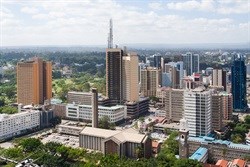RICS releases sub-Saharan African property market report
The Royal Institution of Chartered Surveyors (RICS), an international professional body focused on the areas of land, real estate, construction and infrastructure, has released its report on 'Unleashing Sub-Saharan African Property Markets', which indicates that there are increased opportunities in the business, residential and retail property sectors and opportunities for African professionals.

Nairobi, Kenya - © Natalia Pushchina, Fotolia.com
Africa's growth story will lead to increased demand in a range of sectors, most notably the real estate market. The continent's growth has been spurred by commodity prices such as gas and oil, as well as a growing middle class.
The report was commissioned by RICS to understand the potential role that it, and chartered surveyors who comply with international standards, could play in key real estate markets in Sub-Saharan Africa (SSA).
The report concentrates on five key case study countries in the region - South Africa, Kenya, Ghana, Nigeria and Tanzania. It aims to share insights gained in these markets and highlights various opportunities and challenges, including how the profession is managed and supported, regulatory enablers and constraints and skills development for new or aspiring professionals. The research report also captures the sentiments of working professionals, member organisations and other stakeholders in the built environment sector and presents a snapshot of the potential the real estate markets in Sub-Saharan Africa has to offer.
Talking points
- Ghana: Rapid urbanisation, steady economic growth, and an expanding middle class are creating opportunities for growth, not least of all in property development. Ghana's construction industry is growing steadily, making up over 9% of GDP in 2011, with a similar amount comprised of finance, real estate and business services. There are also opportunities for developers of residential accommodation as demand for modern, high-quality dwellings in prime areas by expatriates and skilled resident workers is robust.
- Kenya: The capital city, Nairobi, is fast entrenching itself as a regional commercial hub. This has seen office space stabilising due in large part to international corporates setting up regional headquarters there. This has increased market absorption of the oversupply of office space in the capital city. Due to the rapidly growing middle class, the mortgage sector is showing new developments and increased competition. Regardless, it still only remains accessible to a small portion of the population as the average interest rate on a mortgage was 19% at 2012 year end.
- Nigeria: As is the case with many Sub-Saharan African countries, Nigeria has experienced high levels of urbanisation, which continues to underpin the demand for both residential and commercial space at different levels of the market. There are strong indicators that the Nigerian economy will continue to experience strong growth of the middle-class, which should further bolster demand for middle-income housing units. In 2012 a study of students enrolled in various built environment programmes in south-west Nigeria revealed that tertiary institutions should incorporate more entrepreneurial studies that aim to increase the skill sets and knowledge bases of the students so that they can benefit to a greater extent from entrepreneurial activities.
- South Africa: It has a relatively mature property market. Despite lower economic growth forecasts, the country is due to remain an attractive investment opportunity, often acting as a springboard to the rest of Africa. South Africa's development is hampered by a serious shortage of skilled engineers, especially in the public sector, and has been described as one of the worst capacity crises in years. South Africa's ratio of 473 engineers per million citizens is still very low, even when compared to other developing countries such as Chile (1,460) or Malaysia (1,843).
- Tanzania: Labour force skills levels are considered low in Tanzania. There is, however, an increase in the number of real-estate related tertiary courses that will support the professionalisation and credibility of the market and its participants. Tanzania has recorded strong growth over the past decade, despite a slump in 2010, off the back of the global financial crisis. Growth has largely been driven by the performance of the services sector, and investments in natural gas. The construction sector, driven by increased buildings activity, road and bridge developments and land improvement activities, also showed robust performance, comprising 8.8% of GDP in 2011.
To download the report, go to Unleashing Sub-Saharan African Property Markets.




























